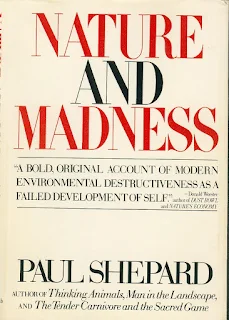Debased versions of Paul Shepard's ideas are everywhere. There were online and magazine articles in late 2017 about a new book that dared to suggest that the transition from hunter-gatherers to agriculture in human history might not have been the unalloyed triumph it is assumed to have been--that for example, hunter-gatherers were healthier. Shepard wrote this, and made a sophisticated case for it, at least 30 years before.
Similarly, several books in the past decade or so have asserted the crucial role of nature in child development. Shepard showed how profoundly true this is, also more than 30 years ago. Even the Paleo Diet is distantly derived from the case he made for today's humans being physically just the same as we were in the paleolithic, but we don't eat (or do anything) that way anymore, with unhealthy results. Shepard had much more profound insights in that direction in the 1970s, including a much longer list of consequences.
Even President Obama
quoted the title of one of his books, probably without realizing it, when he referred to this as "the only world we've got."
Yet Shepard is seldom credited. Even his role as a pioneer of ecology is largely forgotten, at least by the mainstream. Better known names often know his work and speak very highly of it, but they remain the better known names.
In his many books, Paul Shepard (1925-1996) combined a breathtaking synthesis backing strong and profound analysis. He essentially created the field of human ecology, and his work defines it. Apparently few have been able to match both his breadth and depth, so he remains unique.
There is biographical and other information at the Paul Shepard wordpress
site. This is a condensed version of an earlier site I created in tandem with his widow Florence Rose Krall Shepard, herself an author (of
Ecotone and the more recent
Sometimes Creek: A Wyoming Memoir.) I might do another site sometimes soon.
But for the moment I've just posted
my 1997 essay on Shepard, "The Ecology of Maturity" at my companion blog Kowincidence. And on this blog I'm beginning a series of quotes:
Shepard for the Day (modeled of course after the "Emerson for the Day" site that Kim Stanley Robinson invented for his Science in the Capitol climate crisis trilogy, now edited and combined in a single volume,
Green Earth. Then somebody actually started such a site.)
I've quoted Shepard here before, going back more than a decade (the
paul shepard label will take you to those) but this time I'm trying something a bit different.
I'm starting Shepard for the Day with sequential quotes from his book
Nature and Madness. Originally published in 1982, it became part of the series of new Shepard editions by University of Georgia Press, with 1998 forewords. In the foreword to this book C.L. Rawlins writes:
"Of his many distinguished books, Shepard believed Nature and Madness to be the most important, for its presentation of what amounts to a unified field theory of the human condition.
To support this, he draws from a stunning array of disciplines. His research in the fields of biology, genetics, zoology, anthropology, psychology, ethology, history, theology, poetics and myth is deployed not to demonstrate his intellectual powers, grand as they are, but because all these are necessary components of human ecology, a field of study that he practically founded."
Shepard's prose is dense in meaning but I read it as quite eloquent and accessible. Perhaps both his meaning--so different from mainstream thought-- as well as the virtues of his writing can be experienced more clearly and profoundly in shorter bits, such as a paragraph or two. Anyway, that's the experiment I'm beginning.
Because it's really, really important. Shepard may not be well known generally, but he has made deep and lasting impressions to that effect on individuals. That's fitting in a way, because although this book presents a societal indictment, it ultimately is about effects on individuals.
Rawlins' foreword details Shepard's influence on him (also my approach in my 1997 essay, a version of which was published in the Shepard tribute issue of Wild Duck Review.) And like Rawlins, I found my first copy of
Nature and Madness on a bookstore sale table (he in Moab, Utah in 1993, me in Seattle in 1988 or so), though I had been familiar with some of Shepard's early work in the 1970s.
Nature and Madness speaks for itself, but its major premise is that western civilization has been crazy from the start, due primarily to the broken relationship with nature that humanity had for most of its existence. And because of this, society and individuals within it have not developed to a true maturity. Rawlins:
"And so it is, Shepard writes, with the stalled development that accompanies modern culture--we feel a bone deep fury, one we discharge through fanatical belief, unending war, and the accelerating destruction of our world."
Rawlins interprets Shepard as saying
"that mass culture draws collective power from blocking individual development." That's a profound thought to be thinking right now. Expect more.

















No comments:
Post a Comment